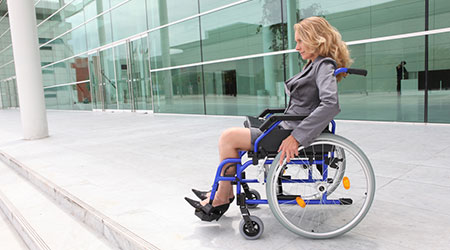
House Votes to Alter ADA
February 16, 2018
The Americans with Disabilities Act (ADA) is in the cross-hairs.
The ADA, which became law in 1990, is a civil rights law that prohibits discrimination against individuals with disabilities in all areas of public life. ADA’s Title III prohibits private places of public accommodation — including privately-owned, leased or operated facilities like hotels, restaurants, retail merchants, doctor’s offices, golf courses, private schools, day care centers, health clubs, sports stadiums, movie theaters — from discriminating against individuals with disabilities. This title sets the minimum standards for accessibility for alterations and new construction of facilities. It also requires public accommodations to remove barriers in existing buildings where it is easy to do so without much difficulty or expense.
Learn: How to avoid ADA compliance issues
This week, the U.S. House of Representatives passed legislation that would amend the ADA over objections from disability rights advocates and Democratic leaders, who warned that the bill would remove incentives for businesses to comply with the law, according to The Washington Post.
Under the bill, those wishing to sue businesses in federal court over an ADA public-accommodations violation must first deliver a written notice to that business detailing the illegal barrier to access and then give that business 60 days to come up with a plan to address the complaints and an additional 60 days to take action. The ADA Education and Reform Act passed on a 225-to-192 vote, with 12 Democrats joining all but 19 Republicans to approve a bill that proponents say is aimed at curbing unscrupulous lawyers who seek profit by threatening businesses with litigation without actually seeking to improve access for the disabled.
Read: ADA and open offices
Activists say the bill, if enacted, would essentially gut the ADA’s provisions dealing with public accommodations by removing any incentive that businesses have to comply with the law before a complaint is filed.
“We know of no other law that outlaws discrimination but permits entities to discriminate with impunity until victims experience that discrimination and educate the entities perpetrating it about their obligations not to discriminate,” says a September letter from the Consortium for Citizens with Disabilities signed by more than 200 disability rights groups.
The bill’s sponsor, Rep. Ted Poe, R-Texas, says the bill is intended to protect businesses from improper lawsuits, and it is endorsed by a number of business associations, including the America Hotel and Lodging Association and the International Council of Shopping Centers.
This Quick Read was submitted by Dan Hounsell — dan.hounsell@tradepressmedia.com — editor-in-chief of Facility Maintenance Decisions.
Next
Read next on FacilitiesNet












